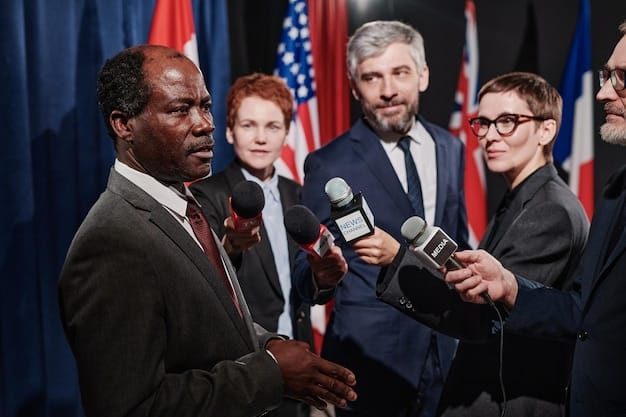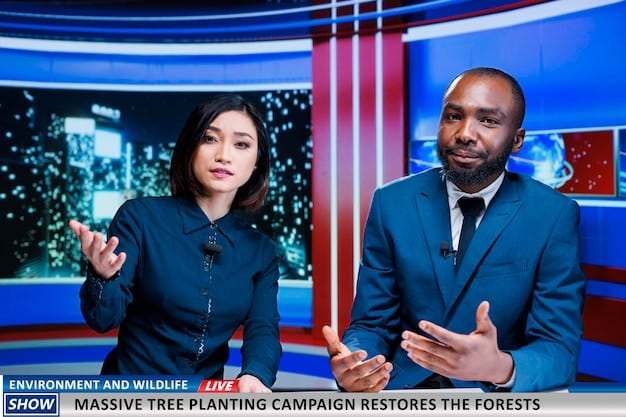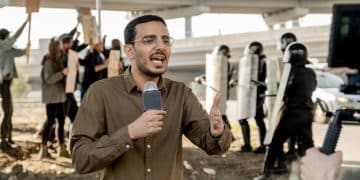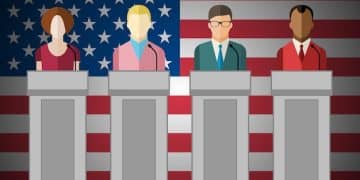Political Figures Article – political__fayrwatchercom_5_1752524269_0019316d__what_are_.html

Political figures in 2025 face key challenges in maintaining public trust, including navigating disinformation, addressing economic anxieties, ensuring ethical governance, responding to social and cultural divisions, and adapting to technological advancements in communication and campaigning.
Political figures navigate an increasingly complex landscape where maintaining public trust is paramount yet exceptionally challenging. The year 2025 presents a unique confluence of factors that demand careful consideration and strategic action. This article explores what are the key challenges facing political figures in maintaining public trust in 2025, offering insights into the dynamics shaping public perception and effective strategies for leaders to build and sustain credibility in the eyes of the electorate.
Disinformation and the Erosion of Truth
The proliferation of disinformation poses a significant threat to public trust. Political figures must actively combat false narratives and promote accurate information to maintain credibility.
The Echo Chamber Effect
Social media algorithms often create echo chambers, where individuals are primarily exposed to information confirming their existing beliefs. This can exacerbate polarization and make it difficult for political figures to reach across the aisle with factual information.
Political figures need to actively engage with diverse communities online and offline to break through these echo chambers.
Combating Deepfakes and AI-Generated Misinformation
Advancements in artificial intelligence have made it easier to create convincing but fake videos and audio recordings, known as deepfakes. These can be used to spread false information and damage the reputation of political figures.
- Invest in technology to detect deepfakes and other forms of AI-generated misinformation.
- Work with media outlets and social media platforms to quickly debunk false information.
- Educate the public on how to identify and avoid falling for misinformation campaigns.

In conclusion, the spread of disinformation is a critical challenge that political figures must address proactively. By investing in detection technology, working with media outlets, and educating the public, leaders can help maintain trust in an era of fake news.
Economic Anxiety and Inequality
Persistent economic anxieties and growing inequality can erode public trust in political figures. Addressing these issues with concrete policies is crucial for maintaining credibility.
The Widening Wealth Gap
The gap between the rich and the poor continues to widen in many countries, leading to resentment and a sense that the system is rigged against ordinary citizens. Political figures must advocate for policies that promote economic fairness.
Job Displacement and the Future of Work
Automation and globalization are disrupting traditional industries, leading to job displacement and economic insecurity for many workers. Political figures need to support retraining programs and policies that help workers adapt to the changing economy.
- Support policies that promote wage growth and protect workers’ rights.
- Invest in education and training programs to help workers acquire new skills.
- Implement policies that address income inequality, such as progressive taxation and universal basic income.
In summary, economic anxiety and inequality pose significant challenges to public trust. Political figures can respond by advocating for policies that promote economic fairness, support workers, and address income inequality.
Ethical Governance and Transparency
Upholding high ethical standards and ensuring transparency in governance are essential for maintaining public trust. Scandals and perceived corruption can quickly erode public confidence.

Addressing Corruption and Conflicts of Interest
Corruption and conflicts of interest can undermine public trust in government institutions. Political figures must be vigilant in preventing and addressing these issues.
Transparency in financial dealings and adherence to ethical guidelines are critical for building trust.
Promoting Accountability and Oversight
Holding public officials accountable for their actions is essential for maintaining public trust. Independent oversight bodies and strong whistleblower protections can help ensure that government operates in the public interest.
- Implement strict ethics rules for public officials and ensure that they are enforced.
- Establish independent oversight bodies to monitor government activities.
- Protect whistleblowers who report wrongdoing.
Ultimately, ethical governance and transparency are crucial for maintaining public trust. Political figures must prioritize integrity and accountability to build confidence in government.
Social and Cultural Divisions
Deepening social and cultural divisions can make it difficult for political figures to unite the country and maintain public trust. Addressing these divisions requires empathy and a willingness to engage in open dialogue.
Navigating Identity Politics
Identity politics, which focuses on the interests and perspectives of particular social groups, can create divisions and make it difficult to find common ground. Political figures must strive to bridge these divides by promoting inclusivity and understanding.
Addressing Systemic Injustice
Systemic injustices, such as racial discrimination and gender inequality, can erode public trust in institutions. Political figures need to address these issues with concrete policies that promote fairness and equal opportunity.
Political leaders need to foster dialogue and understanding between different groups.
In conclusion, social and cultural divisions pose significant challenges to public trust. By promoting inclusivity, addressing systemic injustices, and fostering dialogue, political figures can help bridge these divides and build a more united society.
Technological Advancements and Digital Engagement
The rapid pace of technological advancements presents both opportunities and challenges for political figures seeking to maintain public trust. Effectively utilizing digital platforms while addressing concerns about privacy and security is crucial.
Balancing Online Engagement with Privacy Concerns
While social media and other digital platforms offer valuable tools for engaging with constituents, they also raise concerns about data privacy and security. Political figures must be transparent about how they collect and use data, and they must take steps to protect the privacy of their supporters.
Combating Cyberattacks and Ensuring Digital Security
Cyberattacks can undermine public trust in political institutions and disrupt democratic processes. Political figures must invest in cybersecurity measures to protect their campaigns and government systems from attack.
- Implement strong cybersecurity measures to protect against cyberattacks.
- Be transparent about how data is collected and used.
- Address concerns about privacy and security.
Therefore, technological advancements present both opportunities and challenges for political figures. By embracing digital platforms while addressing concerns about privacy and security, leaders can maintain public trust in the digital age.
Global Challenges and International Relations
Global challenges, such as climate change, pandemics, and international conflicts, can impact public trust in political figures’ ability to address complex issues effectively.
Addressing Climate Change
Climate change is an urgent global challenge that requires international cooperation. Political figures must demonstrate a commitment to addressing climate change and promoting sustainable development.
Responding to Global Health Crises
Pandemics and other global health crises can test the public’s trust in government institutions. Political figures must be prepared to respond quickly and effectively to these crises.
- Collaborate with international partners to address global challenges.
- Demonstrate a commitment to addressing climate change and promoting sustainable development.
- Be prepared to respond quickly and effectively to global health crises.
In closing, global challenges can significantly impact public trust. Political figures can maintain trust by collaborating with international partners, addressing climate change, and effectively responding to global health crises.
| Key Point | Brief Description |
|---|---|
| 📢 Disinformation | Combating false narratives to maintain credibility. |
| 💰 Economic Anxiety | Addressing inequality and job displacement. |
| ⚖️ Ethical Governance | Upholding high ethical standards and transparency. |
| 🌐 Global Challenges | Addressing climate change and health crises. |
FAQ
▼
Political figures should invest in technologies to detect deepfakes, work with media to debunk false information, and educate the public on identifying misinformation.
▼
Supporting wage growth, investing in job retraining, and implementing progressive taxation can help alleviate economic anxiety and reduce inequality.
▼
Implementing strict ethics rules, establishing independent oversight bodies, and protecting whistleblowers are crucial steps to ensure ethical governance.
▼
Technological advancements require political figures to balance online engagement with privacy concerns and to combat cyberattacks to ensure digital security.
▼
Global challenges like climate change and pandemics require international cooperation, commitment to sustainability, and effective crisis response to maintain public trust.
Conclusion
In 2025, political figures face a complex array of challenges in maintaining public trust, ranging from disinformation and economic inequality to ethical governance and global crises. Addressing these issues requires proactive strategies, transparent communication, and a commitment to serving the public interest. By focusing on these key areas, political leaders can build stronger relationships with their constituents and foster a more trusting and engaged society.





